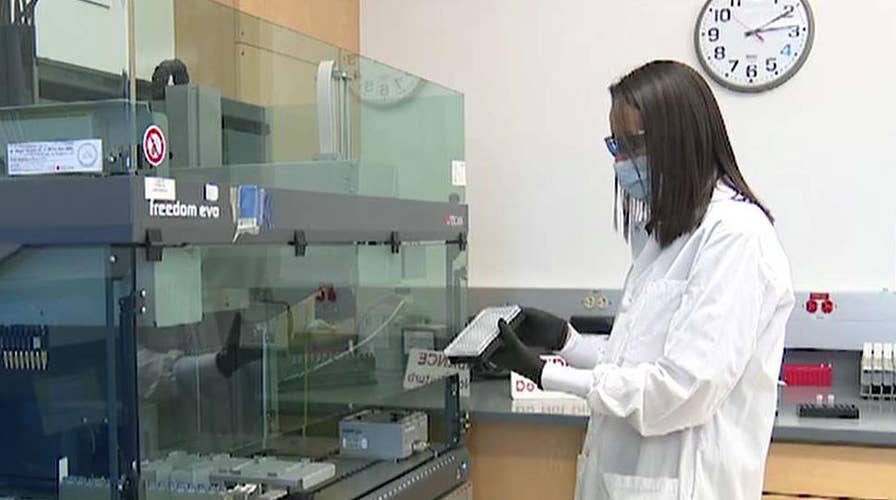FBI collaborates with the National Institute of Justice to test backlogged sexual assault kits.
Over the past five years, in collaboration with the NIJ, the FBI has found 829 matches to backlogged sexual assault kits.
The FBI calls it "one of the most difficult and complex issues facing our nation’s criminal justice system."
Growing stockpiles of untested sexual assault evidence kits have been plaguing U.S. law enforcement for decades, and the FBI and the National Institute of Justice just wrapped up a massive, years-long partnership to hopefully make this problem a thing of the past.
Five years ago, the two government agencies teamed up with local law enforcement to tackle the issue, and chip away at the massive backlogs of untested Sexual Assault Kits (SAKs) that have been creating headaches for crime-solvers nationwide.
After a reported sexual assault, evidence for a SAK is collected and stored. This can sometimes consist of a single piece of evidence, or upwards of a dozen, and getting actual results is nothing like what you see on "CSI: Crime Scene Investigation."
"It's not about testing kits, it's about solving cases."
The costs, and the painstaking process of testing them has contributed to thousands of SAKs sitting on evidence shelves across the country without ever being tested. Some of them can date as far back as nearly half a century.
In 2014, the director of the Office of Investigative and Forensic Sciences at the National Institute of Justice, Gerry LaPorte, decided it was time to start trying to get ahead of the decades-long dilemma.
LaPorte set out to not only try and improve methods for testing SAKs, in the hopes of increasing efficiency in local laboratories, but to actually test some of these kits for local agencies, as well.
Finding a partner in this effort, LaPorte said, was a different story. Thankfully, the FBI Laboratory division said it was willing to chip in "within about 30 seconds."

A memorial stone outside of the FBI Laboratory division building at Marine Corps Base Quantico, VA. (Fox News/Alex Diaz)
Under the NIJ-FBI Sexual Assault Kit Partnership, local law enforcement agencies could send SAKs to be tested free of charge. In addition to the free testing, the NIJ and FBI would use those kits, and the hours spent testing them, to create new best practices that local laboratories could use to streamline their own testing.
The volume of the backlog itself wasn't the only issue, although the number of untested kits did number in the tens of thousands. "These are Sexual Assault Kits that go back sometimes into the 1970's," LaPorte told Fox.
Despite the uphill battle involved in testing thousands of kits, while also trying to streamline the testing process itself, the efforts seem to have paid off.
The FBI laboratory alone tested some 3,600 kits and found they had matches for more than 800 suspects whose DNA profiles were already in the national database known as CODIS. That was in addition to the nearly 2,000 new entries they put into the system.
Beyond the FBI lab's efforts, the partnership itself produced even more staggering numbers. Thanks to grants provided to the partnership by the DOJ's Bureau of Justice Assistance (BJA), more than 60,000 kits were inventoried, nearly 40,000 more were tested to completion, and a total of nearly 14,000 new individuals were entered into CODIS.
For the Las Vegas Metropolitan Police Dept. crime lab, one of the first agencies to team up with the FBI/NIJ, the partnership was the catalyst that has helped eliminate a decades-old backlog in just five years.
After starting off with an identified backlog that was just shy of 10,000 kits, "we have a little over 300 remaining, but all of the testing is in progress and should be completed in the next couple of months," said Kim Murga, the LVMPD director of laboratory services.
TESTING OF 100K BACKLOGGED RAPE KITS LEADS TO 1,000 ARRESTS
Over the course of testing the backlogged kits in her laboratory, Murga and her team matched DNA to suspects in 17 different states. One of the matches they turned up resulted in the arrest of a former city police officer, who has now been charged as a suspect in a cold case murder dating back to the '90s.

This photo provided by the Washoe County Sheriff's Office, shows Arthur Sewall, 51, a former Las Vegas police officer who was arrested as a suspect in a 1997 murder in southern Nevada, is pictured in this Jan. 11, 2018 booking photo at the Washoe County Jail in Reno provided by the Washoe County Sheriff's Office. He's being held without bail on open murder and sexual assault charges after his arrest last week. (Washoe County Sheriff's Office via AP)
Murga said she didn't realize how much help was available until she started looking for it, and she hopes to serve as an example for law enforcement agencies who might be facing similar hurdles, and who still haven't reached out for assistance.
State-level initiatives are starting to spring up across the country, and grants are still being awarded by groups like the BJA. With all of that in mind, Murga said she hopes that the progress made by her team, as well as the FBI/NIJ partnership at large, inspires more agencies to reach out for help and get a handle on this important issue.
"It's not about testing kits," Murga said, "it's about solving cases, and that's what the focus has to be on."
CLICK HERE TO GET THE FOX NEWS APP
The push to solve more sexual assault cases comes as the DOJ's Bureau of Justice Statistics reported more and more victims are starting to report their crimes to police. And as LaPorte makes clear, the entire effort has always been about helping victims.
"Any little thing we can do to help the victim get justice," LaPorte said, "and then prevent - that's the key part too, to prevent this from happening in the future."










































